News
Tension, concerns across Nigeria, as ‘EndBadGovernment’ Nationwide Protest kicks off, August
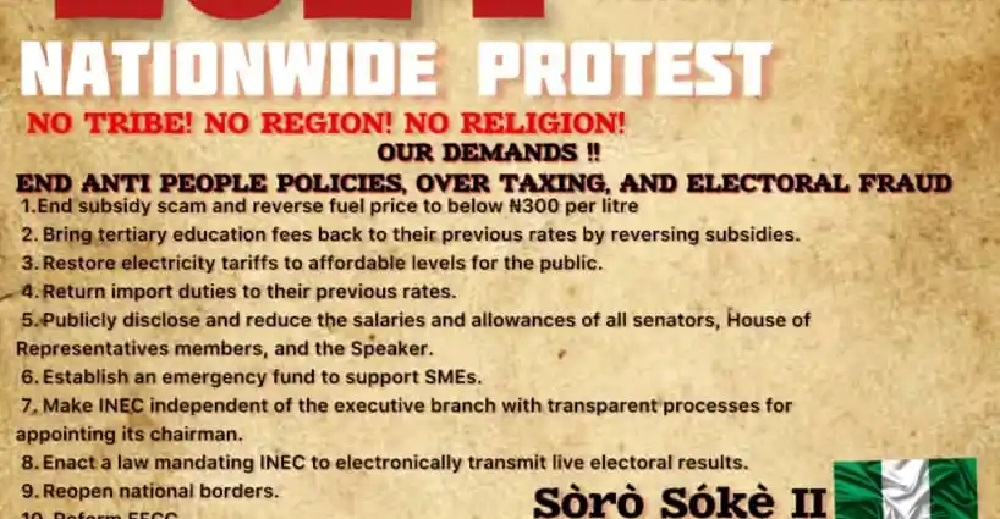
A nationwide protest titled “End Bad Government in Nigeria 2024” is scheduled to take place from August 1st to August 10th, 2024. The protest, organized under the banner “10 Days of Rage,” aims to address multiple grievances against the current government. This movement is expected to be widespread, involving significant participation from various regions, tribes, and religious groups across the country.
Protest Details:
The protest will run for ten days, from August 1st to August 10th, 2024. Its main slogan, “We Are Not Slaves,” emphasizes the protesters’ resolve. The scope of the protest is nationwide, with major activities planned in key cities including Lagos, Abuja, Kano, Port Harcourt, Enugu, and Kaduna.
The protesters have outlined several primary demands, including ending subsidy scams and reducing fuel prices to below ₦300 per liter, reverting tertiary education fees to previous rates by reversing subsidies, restoring affordable electricity tariffs, reinstating previous import duty rates, publicly disclosing and reducing the salaries and allowances of all senators, House of Representatives members, and the Speaker.
They also demand the establishment of an emergency fund to support SMEs, ensuring INEC’s independence with transparent processes for appointing its chairman, mandating INEC to electronically transmit live electoral results, reopening national borders, reforming the EFCC, declaring a state of emergency on inflation, and reforming the judiciary.
Mobilization and Logistics:
Protesters are advised to wear white (with black) attire. They are also encouraged to bring placards, handkerchiefs, a bottle of water, a white cloth or ribbon, and the Nigerian flag. Meet-up locations include all LGA, House of Rep members’ residences, and Governor’s offices across the country. In Abuja, protesters are to gather at the National Assembly Building. Specific instructions have been given for protesters in Lagos, Kano, Port Harcourt, Abuja, Enugu, and Kaduna to block all roads leading to the cities and airports on the first day of the protest (August 1st).
Use of Social Media:
The organizers are leveraging Twitter a.k.a X to gain momentum and gather followers. Social media platforms, especially Twitter, are being used extensively to disseminate information, coordinate activities, and mobilize participants. Hashtags such as #EndBadGovernanceInNigeria, #TinubuMustGo and #ENDBGIN are trending and helping to galvanize support across the nation.
This strategy is reminiscent of the #EndSARS movement in 2020, where Twitter played a crucial role in mobilizing large numbers of protesters and coordinating their actions. Notable handles pushing this current protest include @AnonXNG, @IPrinceSaviour, and @felimek.
Potential Security Concerns:
There are several potential security concerns associated with this protest. Given the widespread discontent with the government, a significant turnout is expected, which could lead to large-scale disruptions. The call to block major roads and airports may result in severe traffic congestion and disrupt public order. While the protest is intended to be peaceful, the potential for clashes with security forces and counter-protesters cannot be ruled out. Prolonged protests could also have a detrimental effect on the state’s economy, particularly if businesses and transport services are halted.
Recommendations:
In light of these concerns, it is recommended to enhance surveillance by deploying intelligence personnel to monitor the organizers and key locations mentioned in the protest plans. Increase monitoring of social media platforms to track real-time developments and gather actionable intelligence. Strategic deployment of security forces at critical infrastructure points such as airports, major roads, and government buildings is crucial to prevent any blockade and maintain public order. Engaging with the protest organizers to understand their intentions and potentially negotiate to prevent disruptions should also be considered.
News
Afenifere honours Pa Abraham Adesanya, 17 years after demise
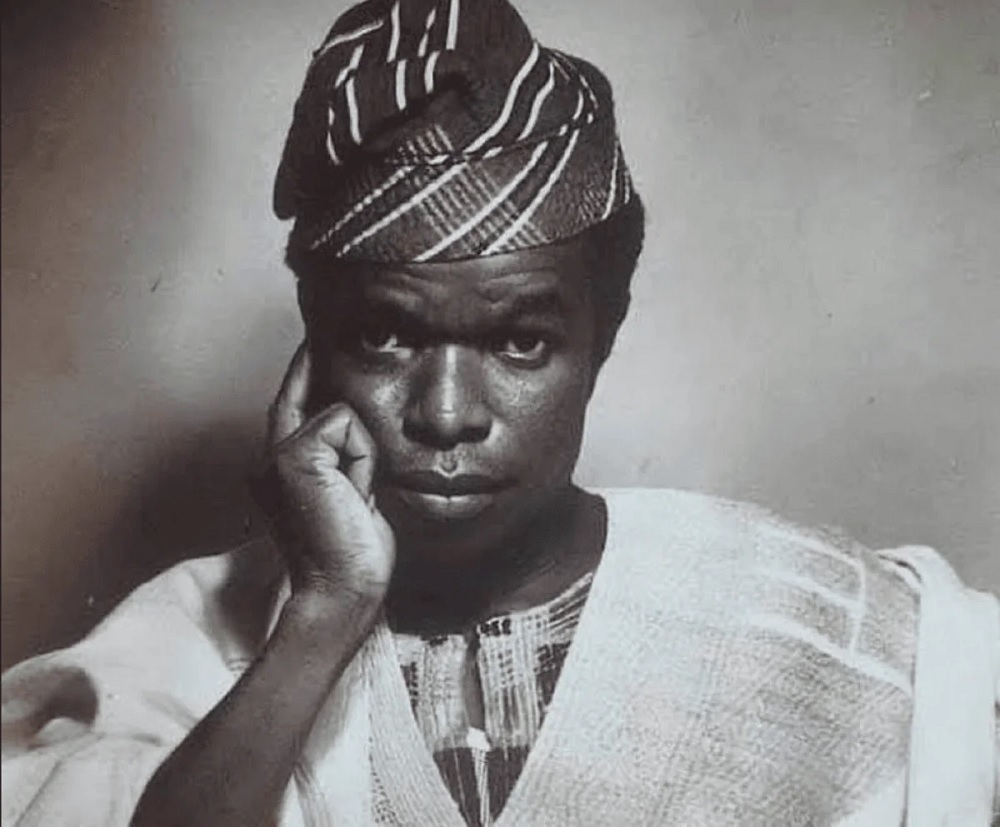
The Pan Yoruba sociopolitical group, Afenifere, on Monday, remember Ed and honoured the late leader of the group, Pa Abraham Adesanya, some 17 years after his departure to the great beyond.
The foremost Yoruba group who paid glowing tributes to its late leader described him as a democrat, highly principled and consistent political leader.
Afenifere, in a statement signed by the National Organising Secretary of Afenifere, Abagun Kole Omololu, said the legacy of the late leader of the group would continue to inspire the way leadere play politics in this country
He said people like him are not many and said “on this solemn day, Afenifere honours the memory of Senator Abraham Adesanya, a titan of conscience, courage, and unyielding patriotism.
“A beacon of progressive thought and an unrelenting advocate for true federalism, Adesanya’s life embodied a profound devotion to the ideals of justice, liberty, and national equity.
“In an era marked by dictatorship and democratic subversion, he stood firm ,a lone voice of moral authority when many had fallen silent.
“His leadership of Afenifere was distinguished not by bluster, but by a dignified tenacity that galvanised a generation yearning for a Nigeria governed by fairness and reason”
He said “Papa Adesanya understood that nations are not sustained by mere geographical boundaries, but by structures built on consensus, equity, and mutual respect.
“His calls for restructuring were neither whimsical nor opportunistic; they were borne of a sagacious understanding that the strength of a nation lies in the inclusivity of its foundations.
“Today, as we reflect on the life of this great statesman,we are reminded that leadership is not merely about office, but about service to enduring principles.
“Afenifere salutes Papa Abraham Adesanya , a steadfast sentinel of democratic ideals and a true architect of hope. May his legacy continue to inspire generations”
News
Speaker Gambia National Assembly Calls for Urgent Action on ECOWAS Crisis
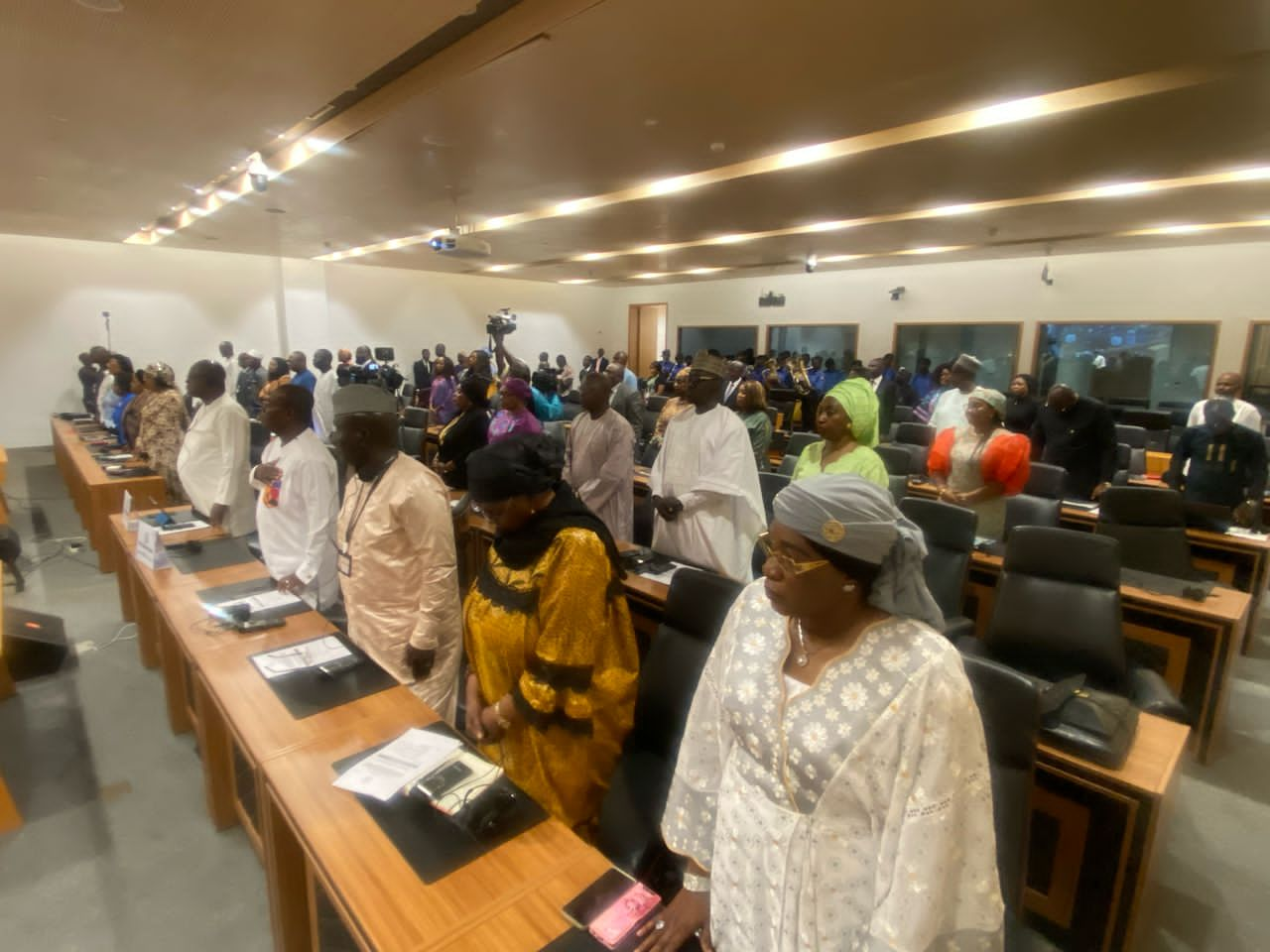
…as foreign minister say member states must be united
By Gloria Ikibah
Speaker of The Gambia National Assembly, Hon. Fabakary Tombong Jatta, has urged members of the ECOWAS Parliament to face the realities of the region’s challenges following the withdrawal of Burkina Faso, Mali, and Niger from the regional body.
Speaking at the opening of the Delocalised Meeting of the ECOWAS Joint Committees on Monday in Banjul, The Gambia, Hon. Jatta said, the joint committee meeting was to ‘Consider the Political, Socio-Economic and Humanitarian Impact of the Withdrawal of Burkina Faso, Mali and Niger from ECOWAS’.
The Speaker who highlighted the importance of the theme, said the situation demands deep reflection.
He said: “The theme under which this meeting is convened is not merely a topic for discussion; it calls for a deeper introspection of the founding principles of ECOWAS and to what extent these principles are serving the wishes and aspirations of our Citizens”.
The Speaker described the withdrawal of Mali, Burkina Faso, and Niger on January 29, 2025, as the most significant crisis in West Africa’s regional integration since the founding of ECOWAS in 1975.
He praised ECOWAS’s approach to the crisis, noting, “It is however worth noting that despite the major setback the withdrawal represents, ECOWAS measured and pragmatic approach shows the commitment to building bridges for cooperation and is highly commendable.”
Hon. Jatta therefore urged parliamentarians to recognize the complex causes of the withdrawal, as he said that the withdrawal could disrupt trade, increase security threats, and affect cross-border communities.
“As you take stock and deliberate on the impact of the withdrawal of the Alliance of Sahel States, do not lose sight of the fact that the departure of the Sahel states reflects a complex web of security concerns, geopolitical realignments and institutional failures.
“The immediate impact includes the potential disruption of established trade routes and economic zones. Port cities and transit trade could experience an economic downturn and cross-border communities and traditional trade networks may face challenges,” he said.
The Speaker warned about wider implications for African unity. “The split of ECOWAS poses profound implications for the African Union’s broader integration agenda, challenging current realities and future assumptions,” he said.
Despite the challenges, Hon. Jatta expressed optimism. that the resolutions that will emerge from this meeting would include strengthening the arm of parliamentary diplomacy to the Sahel states through constructive engagements and collaborations.
“Choosing isolation over regional cooperation would result in economic isolation and increased maritime access costs as landlocked nations. Additionally, they risk reduced foreign direct investment due to perceived instability and limited market access,” he added.
Hon. Jatta therefore called for dedication and urgency. “As parliamentarians, we have a crucial role to play in making this vision a reality. We must, therefore, approach our deliberations with a sense of urgency, commitment and determination, knowing that the hopes and aspirations of millions of ECOWAS citizens rest on our shoulders.
Without any shred of doubt, I am confident that, together, we can overcome the challenges before us and pave the way for a more integrated, peaceful, and prosperous ECOWAS region,” he said.
In his goodwill, Minister of Foreign Affairs of The Gambia, Dr. Mamadou Tangara, called on ECOWAS member states to strengthen unity and solidarity as the region faces critical political and security challenges.
Dr. Tangara noted its significance as the regional body marks its 50th anniversary.
“Your decision to organize this important delocalized sitting in Banjul is a clear testimony of your strong commitment to bring ECOWAS closer to its citizens. “The Government of The Gambia salutes this lofty decision of the Sixth Legislature”, he said.
Addressing the theme of the sitting, the withdrawal of Burkina Faso, Mali, and Niger from ECOWAS, Dr. Tangara described it as unfortunate butemphasised hope for reconciliation.
He stressed that the vision of the founding fathers of ECOWAS and the African Union must continue to guide the region.
“We are all better off together as one family; one united West Africa with a common history, geography and destiny. We can overcome our disagreements and differences. We have the capacity, the readiness and willingness to achieve regional unity.
“Our unity is our strength. Let us work towards attaining African unity as encapsulated in the vision and dreams of the founding fathers,” Dr. Tangara urged.
The Foreign Minister reflected on the original goals of ECOWAS, describing the organization as a symbol of Pan-Africanism and economic emancipation.
And cautioned that the withdrawal of member states could weaken the dream of a united Africa.
“At the heart of the founding of ECOWAS was the recognition of the need for greater Pan-Africanism, African unity, solidarity and the economic emancipation of our states from the vestiges of colonialism.
“Any withdrawal from any of those building blocks by member states undermines African unity, integration and solidarity,” he stated.
Dr. Tangara therefore called for continuous engagement with Burkina Faso, Mali and Niger, as he said, “we cannot lose hope or patience and adopt abandonment as a policy.”
Dr. Tangara emphasised the many achievements of ECOWAS, from peacekeeping efforts to trade and free movement across borders, and challenged the notion that democracy and good governance are foreign to Africa.
“Some of our countries are enjoying peace today thanks to the sacrifices and invaluable contributions made by ECOWAS and its member states. The free movement of goods and people across our borders has become a standard being emulated around the world.
“African citizens have and nurture expectations that they will participate in the choice of their leaders and that their governments will govern justly based on rule of law and respect for human rights,” he said.
Dr. Tangara urged the delegates to focus on pragmatic solutions and regional cooperation, especially in light of growing security threats.
“No state in the region is secure without the security of other states.
“Our common history, our diverse peoples, our shared geography, our rich culture, our collective security and mutual prosperity place a unique burden on all of us here present to pursue unity, integration and prosperity,” he said.
News
True Democracy Means Everyone Must Have a Voice – Speaker Abbas
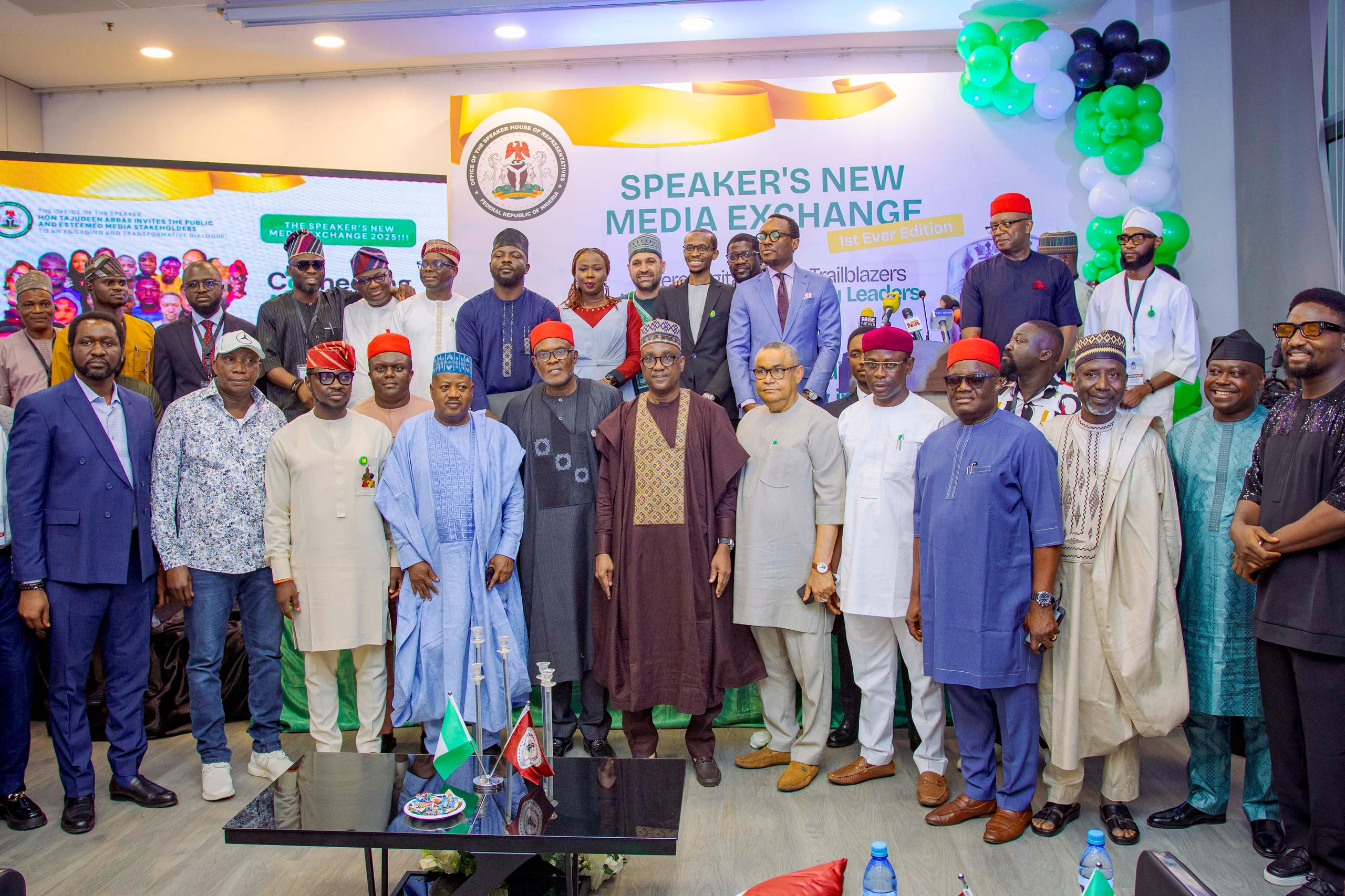
…as young Nigerians, social media influencers push for free speech, national unity
By Gloria Ikibah
Speaker of the House of Representatives, Tajudeen Abbas, says the strength of Nigeria’s democracy should be judged by how much all citizens, especially key groups, are included in decision-making.
Speaker Abbas who stated this while meeting with a group of social media influencers, many of them young Nigerians, at the ‘Speaker’s New Media Exchange 2025’, stressed the importance of youth voices and the role of online platforms in shaping the country’s democracy on Monday in Abuja.
-

 News17 hours ago
News17 hours agoInsecurity: BUDA urges govt to quickly rescue Baruten from terrorists
-

 News23 hours ago
News23 hours agoJust in: Senator Natasha tenders satirical ‘apology’ to Akpabio
-

 News19 hours ago
News19 hours agoUNUSUAL! Without invitation, Police declared me wanted — Daughter of ABC Transport owner
-
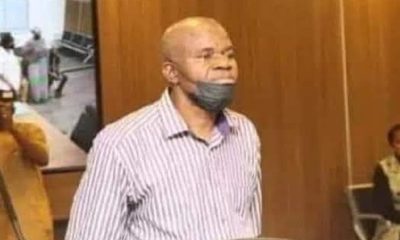
 News14 hours ago
News14 hours agoBreaking: Late gospel singer Osinachi’s husband sentenced to death by hanging
-
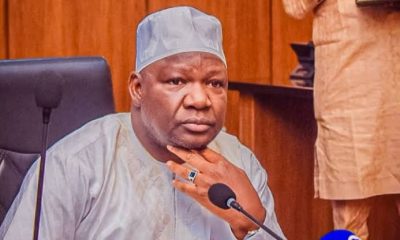
 News16 hours ago
News16 hours agoWeeks to 2nd anniversary, Niger deputy gov, plans to resign, move out personal effects
-
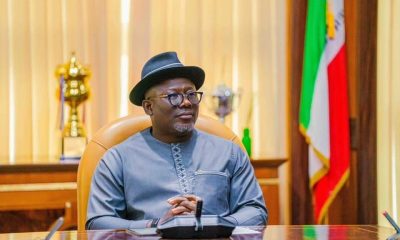
 News20 hours ago
News20 hours agoGov Oborevwori’s top aide suddenly resigns from govt
-

 Entertainment19 hours ago
Entertainment19 hours agoMy tongue slipped, Annie Macaulay apologizes after referring to Herself as ‘Idibia’ at Headies 2025
-

 News24 hours ago
News24 hours ago$220m Fine Judgement Will Affect Our Services In Nigeria, WhatsApp Warns





